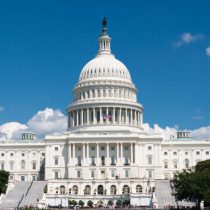

From the United States Chamber of Commerce, Credit the US Chamber Staff:
“We’ve cut off the fuel supply” to businesses, U.S. Chamber President and CEO Tom Donohue explained in Chicago. “And guess what—America’s economic engine is sputtering.”
Following up the successful State of American Business address, Donohue took the Chamber’s pro-growth agenda to Chicago.
In the first of a series of #LetsGrow Tour events across the country—this one in collaboration with the Illinois Chamber of Commerce and Illinois Gov. Bruce Rauner—Donohue explained how poor financial regulations are holding back the economy:
All U.S. businesses—from the Fortune 500 to Main Street shops to nimble startups—need that same kind of access to short- and long-term capital, liquidity, and risk management tools to operate.
They need it to hire, invest, meet payroll, buy inventory, and hedge their bets. Most can’t survive—let alone grow—without it. And our economy can’t grow without them.
Unfortunately, for too many of our job creators, access to those products and services isn’t as available as it should be. Eight years of overregulation has squeezed business financing, raised the cost of capital, limited access to credit, and taken cash out of the economy altogether.
A small business that needs to buy more inventory faces higher costs and greater challenges to getting a short-term loan. An entrepreneur may find that her personal credit history isn’t good enough to secure the startup capital she needs.
A mid-sized firm will have a harder time issuing debt to buy new equipment because there is less liquidity in those markets. High-growth companies are told to wait—or avoid—going public.
Donohue explained three reforms that can fuel faster economic growth.
- Restoring Main Street Lending
Many community banks, mid-sized and regional banks got swept up in costly and burdensome systemic risk regulations. They pose absolutely no threat to the stability of our financial system. Yet they’re still forced to meet steep capital requirements and regulations once they pass certain arbitrary thresholds. As a consequence, banks reduce lending and the smaller businesses that create jobs and drive growth become starved for capital.
The Volcker Rule is also hitting Main Street hard. Designed to ban proprietary trading by banks, the rule has created market stress, hurt liquidity, and unnecessarily raised the cost of capital. Even the Federal Reserve recently acknowledged that the Volcker Rule has made the bond and equity markets less efficient.
The administration and Congress should work together to tailor the rules to fit the institutions being regulated, to come up with a better way of determining which firms are actually risky, and to exempt smaller banks from enhanced regulation.
- Repealing and Replacing the Fiduciary Rule
The Labor Department’s Fiduciary Rule dramatically expanded the definition of a fiduciary investment advisor to private employer-sponsored retirement plans—like 401(k)s, traditional pension plans, and Individual Retirement Accounts.
That means that advisors who have traditionally provided guidance to small dollar savers and small business plans will have to jump through a lot more regulatory hoops. Many will stop offering these services altogether, limiting employees’ retirement options and making it all but impossible for small businesses to offer competitive retirement plans in order to attract top talent.
Last year the Chamber sued the Department of Labor over the Fiduciary Rule—the case is still pending.
In the meantime, we’re not taking any chances. We’re urging the administration to delay the rule, repeal it, and replace it with something that actually meets the needs of small businesses and their employees.
- Reforming the Federal Reserve’s Regulatory Processes
Now let me make clear, the Chamber strongly supports the Fed’s longstanding monetary independence—and we have defended that role against attacks in Congress.
However, the Fed was granted broad new regulatory powers under Dodd-Frank with significant impact on Main Street and economic growth—and those powers must be wielded carefully.
It must eliminate the one-size-fits all approach to regulating systemically important financial institutions—many of which are non-banks struggling to comply with rules designed for the banking industry.
And above all, it must take into account the economic impact of its rules.
The Fed should be mandated to facilitate economic growth and productivity when it is acting as a regulator. This would require the Fed and other banking regulators to use facts and data to ensure that regulations don’t harm the broader economy.
Donohue assured the Windy City audience, “If our leaders choose growth—not just in the financial regulatory system but in all of our major policy areas—business startups will speed up, job creation will accelerate, incomes will rise, poverty will decline, investments will flood in, innovation will flourish, and our deficits will shrink.”
more
Comments are closed.


